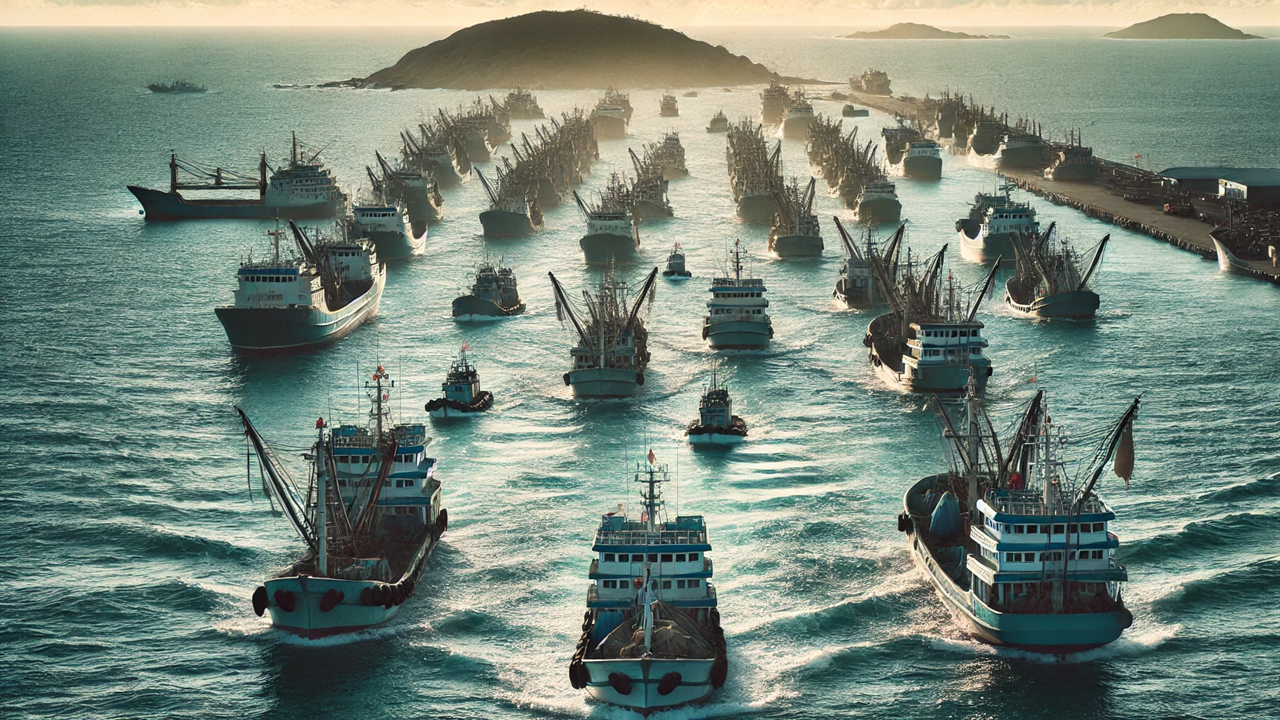Balancing Profit and Sustainability: The Complex World of International Fisheries Agreements
International fisheries access agreements, while offering significant economic opportunities, also pose substantial environmental and social challenges. As outlined in the UNCTAD report International Fisheries Access Agreements: Challenges and Opportunities to Optimize Development Impacts, nations must balance profit-driven fishing practices with the urgent need to protect marine ecosystems. The report urges transparency, sustainability, and collaboration to ensure that coastal states benefit without compromising the future of their fisheries resources.

The world’s oceans are a critical source of sustenance and income for nations worldwide, especially for developing coastal countries. International fisheries access agreements (IFAAs) are at the heart of these relationships, allowing distant water fishing (DWF) fleets from nations such as China, Japan, and the European Union to access coastal waters for fishing. While these agreements provide significant economic benefits, they also come with substantial environmental and social responsibilities. The report International Fisheries Access Agreements: Challenges and Opportunities to Optimize Development Impacts, published by the United Nations Conference on Trade and Development (UNCTAD), sheds light on the complexities of these agreements and their broader impacts on sustainable development.
The Promise of Fisheries Access Agreements
Fisheries access agreements have been a common practice for decades, providing distant water nations access to marine resources within the Exclusive Economic Zones (EEZs) of coastal countries. For the coastal states, particularly in developing regions, these agreements offer an opportunity for economic growth through licensing fees, job creation, and infrastructure development. Additionally, they allow coastal nations to capitalize on resources they may not have the capacity to fully exploit themselves.
According to the UNCTAD report, access agreements have enabled developing countries to earn vital revenues. For instance, in the Pacific Islands, fisheries access fees have contributed significantly to national budgets, particularly through the vessel day scheme (VDS), which ensures fair compensation for fishing efforts. However, despite the financial windfalls, concerns remain about whether these deals truly benefit the local populations or merely enrich foreign fishing companies.
Sustainability and the Overfishing Threat
While international fisheries access agreements bring economic benefits, they also raise critical questions about sustainability. DWF fleets often operate in regions where overfishing has already strained marine ecosystems. The UNCTAD report highlights that many agreements lack transparency regarding the sustainability of the fishing practices employed, which often exacerbates the problem of overfishing. Overfishing not only threatens biodiversity but also endangers the livelihoods of artisanal fishers who rely on these same marine resources for subsistence.
One major issue is illegal, unregulated, and unreported (IUU) fishing. Even within regulated agreements, monitoring and enforcement are frequently inadequate. IUU fishing leads to severe depletion of fish stocks, putting the future of fisheries at risk. Coastal states, particularly in developing regions, often lack the necessary resources and infrastructure to properly monitor the activities of DWF fleets, leading to unsustainable practices.
The Role of International Cooperation and Legal Frameworks
IFAAs are governed by a range of international treaties and agreements, the most prominent being the United Nations Convention on the Law of the Sea (UNCLOS). This treaty gives coastal nations control over the natural resources within their EEZs and requires that distant water nations seeking access comply with sustainability and conservation guidelines.
However, compliance with these regulations is not always straightforward. The report stresses the need for greater international cooperation to strengthen regulatory frameworks and ensure that agreements prioritize long-term sustainability. Coastal countries must be equipped with better tools and technologies, such as satellite-based vessel tracking systems, to monitor fishing activities more effectively.
In some regions, progress is being made. For instance, the Pacific Island countries have adopted the VDS, which allocates fishing days to DWF fleets in exchange for payment. This system has improved transparency and increased revenue for participating countries. However, much more needs to be done to bring other regions up to par.
Recommendations for a Balanced Future
The UNCTAD report offers a series of recommendations aimed at optimizing the development impacts of fisheries access agreements while safeguarding marine resources for future generations. One of the primary recommendations is increasing transparency in negotiations and enforcement. Governments should ensure that agreements are made public and include provisions for monitoring and reporting catch volumes, fishing practices, and sustainability measures.
Another key recommendation is aligning fisheries agreements with the Sustainable Development Goals (SDGs). Specifically, SDG 14, which focuses on life below water, emphasizes the need to conserve and sustainably use marine resources. The report suggests that fisheries access agreements should contribute to this goal by promoting responsible fishing practices and ensuring that revenue from these agreements is reinvested in sustainable fisheries management.
Lastly, the report calls for the elimination of harmful fishing subsidies that contribute to overfishing and environmental degradation. These subsidies, often provided to DWF fleets by their home countries, distort the true costs of fishing and encourage unsustainable practices.
International fisheries access agreements represent both a challenge and an opportunity. On the one hand, they provide much-needed economic benefits to developing coastal nations; on the other, they threaten marine ecosystems and the livelihoods of local fishers. The UNCTAD report underscores the need for a balanced approach that prioritizes sustainability, transparency, and collaboration. By aligning fisheries access agreements with global sustainability goals, nations can ensure that their oceans remain a source of life and prosperity for generations to come.
- FIRST PUBLISHED IN:
- Devdiscourse










